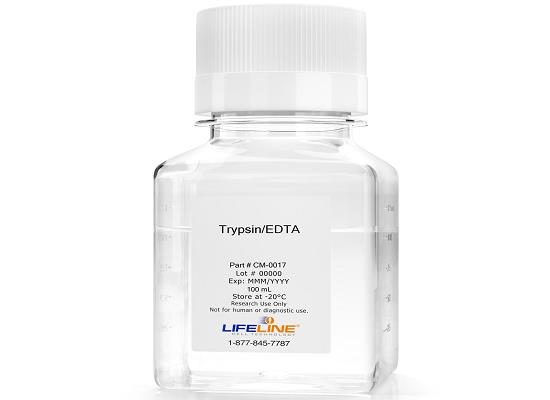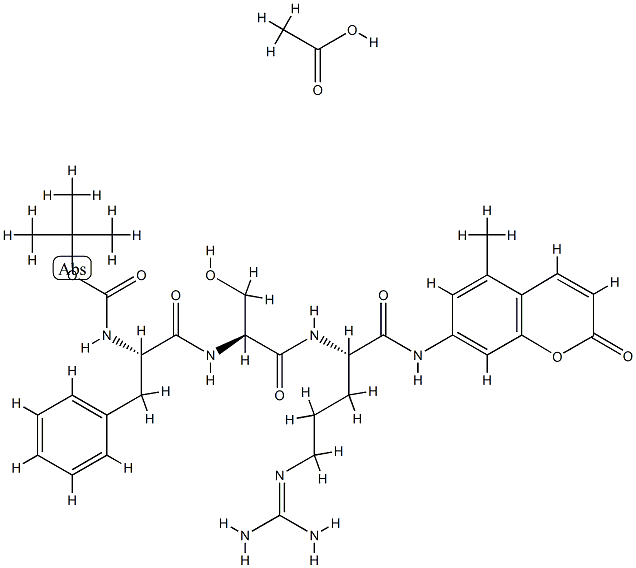Trypsin in colorectal cancer
General Description
Trypsin is a serine proteinase that has traditionally been associated with digestion in pancreatic acinar cells. However, recent studies have shown that trypsin is also expressed in various human tissues, playing important roles in different physiological and pathological processes. In cancer, trypsin is overexpressed in several types of tumors and is believed to contribute to the invasive and metastatic behavior of cancer cells. Its adverse effects are mediated through interactions with other proteinase systems like matrix metalloproteinases (MMPs) and protease-activated receptor-2 (PAR-2). In colorectal cancer, trypsin overexpression is associated with poor prognosis and correlates with advanced disease features. Activation of matrilysin (MMP-7) by trypsin may explain its impact on prognosis. Additionally, upregulation of trypsinogen transcripts and co-expression of trypsin and TATI (trypsinogen-activating enzyme inhibitor) have been observed in CRCs. While trypsin may have a tumor-suppressive effect in certain cancers, it appears to have an adverse effect in colorectal cancer.

Figure 1. Trypsin solution
Native role
Trypsin is a well-known serine proteinase that plays important roles in various physiological and pathological processes. Traditionally, trypsin was thought to be produced only by pancreatic acinar cells for digestion purposes. However, recent studies have revealed that trypsin is expressed in many other human tissues, including skin, oesophagus, stomach, small intestine, colon, lung, kidney, liver, bile ducts, leukocytes, splenic and neuronal cells. There are four different isoforms of trypsinogen found in humans, which are highly homologous at both the nucleotide and protein levels. Trypsin shows selectivity for peptide bonds in protein molecules that contain the amino acids arginine and lysine. To prevent premature activity, trypsin is secreted as an inactive zymogen called trypsinogen in the pancreatic juice, which is then activated by an enteropeptidase found in the alkaline environment of the duodenal lumen. Additionally, trypsinogen can be activated in the duodenal enterocytes or other tissues expressing trypsin that have a trypsin-activating enteropeptidase. The pancreatic secretory trypsin inhibitor (PSTI) serves as an antiproteinase mediator to prevent premature activity. An imbalance in the proteinase-antiproteinase system may cause pancreatitis or increase the risk of developing pancreatic adenocarcinoma. PSTI is also secreted by tumour cells and is known as tumour-associated trypsin inhibitor (TATI), which is identical to PSTI. 1
Trypsin in cancer
Trypsin is a serine protease that has been found to be overexpressed in various human cancer cells, including those of the ovary, prostate, lung, stomach, and colon. It is often referred to as 'tumour-associated trypsin' and is believed to play a role in the invasive and metastatic process of cancer. The contributing role of the tumour environment and its constituents, such as stroma cells, signal molecules, and matrix enzymes, is also being explored in this process. Current evidence suggests that the adverse effects of trypsin in cancer are mediated through interplay with other proteinase systems, such as the matrix metalloproteinases (MMPs) and the recently explored protease-activated receptor-2 (PAR-2). These proteinase cascade systems and their mutual contribution to cancer development are still being studied. Mechanisms by which trypsin induces invasion and metastasis include direct degradation of extracellular proteins, activation and effect of other latent proteolytic cascades like MMPs, and activation of signal molecules like PAR-2. Patients with overexpression of trypsin have been found to have poor prognosis. Understanding the complex interactions between trypsin and other proteinase systems may lead to the development of new therapeutic strategies for cancer treatment. 2
Trypsin in colorectal cancer
Trypsin overexpression has been found to be correlated with poor prognosis in patients with colorectal cancer (CRC). Studies have shown that trypsin immunoreactivity is more intense at the invasive front of CRC tumors compared to the superficial part. Positive staining for trypsin at the invasive front correlates significantly with various factors associated with advanced CRC, such as depth of invasion, lymphatic and venous invasion, lymph node and distant metastasis, advanced tumor stage, and recurrence. Activation of matrilysin (MMP-7) by trypsin, which plays a role in CRC progression, may explain the adverse effect on prognosis, particularly when both trypsin and matrilysin are present. Furthermore, analysis of RNA from malignant colon tumors and corresponding normal mucosa revealed up-regulation of trypsinogen transcripts in about one third of CRCs. Colorectal cancer cell lines also showed expression of trypsinogen mRNA, with higher levels detected in metastatic tumor cell lines. Trypsinogen-2 was found to be the dominant isoform in colon tissue, and upregulation of trypsinogen-1 expression in colon tumors may be associated with a metastatic phenotype. Immunohistochemical and RT-PCR analysis demonstrated the co-expression of trypsin and TATI (trypsinogen-activating enzyme inhibitor) in CRCs, both at the protein and mRNA levels. In adjacent non-malignant tissues, distinct patterns of trypsin and TATI expression were observed, with both mRNA detected but no immunohistochemical expression. It is worth noting that while trypsin may have a tumor-suppressive effect in certain types of cancer, such as oesophageal and gastric cancers, evidence suggests an adverse effect in CRC. 3
Reference
1. DeClerck Y A, Mercurio AM, Stack MS, Chapman HA, Zutter MM, Muschel RJ, et al Proteases, extracellular matrix, and cancer: a workshop of the path B study section. Am J Pathol 2004;164:1131–1139.
2. Yamamoto H, Iku S, Adachi Y, Imsumran A, Taniguchi H, Nosho K, et al Association of trypsin expression with tumour progression and matrilysin expression in human colorectal cancer. J Pathol 2003;199:176–184.
3. Solakidi S, Tiniakos DG, Petraki K, Stathopoulos GP, Markaki I, Androulakis G, et al Co-expression of trypsin and tumourassociated trypsin inhibitor (TA TI) in colorectal adenocarcinomas. Histol Histopathol 2003;18:1181–1188.
);You may like
Related articles And Qustion
Lastest Price from Trypsin manufacturers

US $10.00/kg2024-05-16
- CAS:
- 9002-07-7
- Min. Order:
- 1kg
- Purity:
- 99%
- Supply Ability:
- 20ton

US $80.00/kg2024-05-10
- CAS:
- 9002-07-7
- Min. Order:
- 10kg
- Purity:
- 0.99
- Supply Ability:
- 20tons



